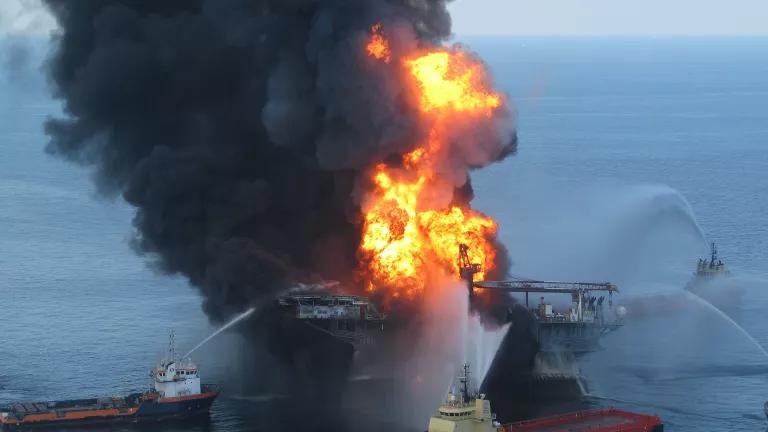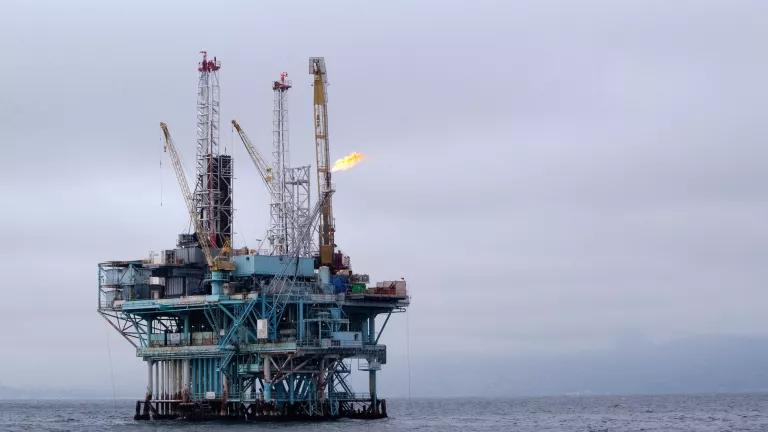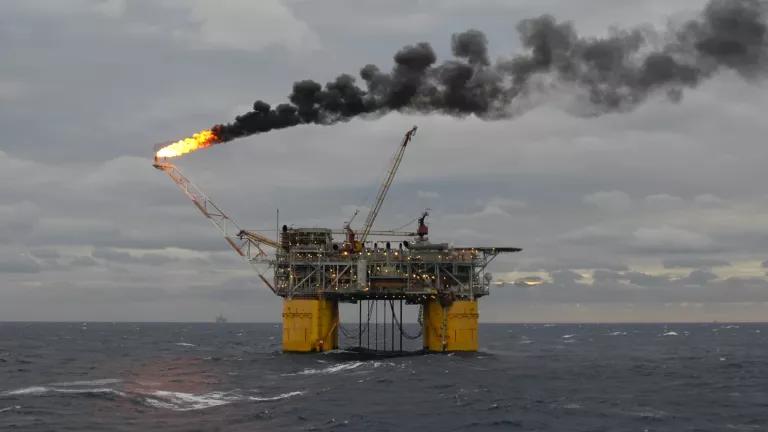Fourteen Years After Deepwater Horizon, Drilling is Still a Threat
Despite the devastation of the BP Deepwater Horizon disaster, offshore drilling remains a threat to communities, our ocean, and the climate.

Oil supply boats use water cannons to fight fire and smoke rising from BP's mobile offshore drilling unit called Deepwater Horizon following an explosion on the rig in the Gulf of Mexico.
U.S. Coast Guard
Fourteen years after the BP Deepwater Horizon oil spill in the Gulf of Mexico, it could happen again. The devastating consequences of our dependence on fossil fuels are especially clear as we look back on one of the greatest environmental disasters in history. On April 20, 2010, barrels upon barrels of oil gushed into the Gulf of Mexico following an explosion on the BP Deepwater Horizon oil rig. The explosion took the lives of 11 workers stationed on the rig and unleashed roughly 3.19 million barrels (134 million gallons) of oil into the Gulf, which flowed for 87 days. To say that the spill was catastrophic for marine ecosystems, coastal communities, and Gulf South economies would be a grotesque understatement. The impacts of the disaster continue to reverberate throughout the Gulf South today.
Beyond the devastating impacts for marine ecosystems, the BP Deepwater Horizon disaster had a profound human impact. The spill oiled 1,300 miles of shoreline across Alabama, Mississippi, Louisiana, Texas, and Florida. The surface oil slick cumulative extent totaled 43,300 square miles (approximately equal to the size of Virginia). Fishermen saw their livelihoods erased as state and federal fisheries were closed in the Gulf of Mexico. Coastal economies lost hundreds of millions of dollars in commercial fishing and tourism because of the fossil fuel industry’s reckless pursuit of profit. The fossil fuel industry is pushing for even more offshore drilling despite the clear evidence of what happens when they drill and who bears the consequences.

A Rice's Whale in the Gulf of Mexico. Credit: NOAA Fisheries/Laura Dias (Permit #14450)
Of the many species hit by the BP Deepwater Horizon oil spill, one of the most impacted species was the Gulf of Mexico whale (also known as Rice’s whale). This whale is endemic to the Gulf of Mexico, and offshore drilling is hurtling the species toward extinction. Although the BP Deepwater Horizon drilling platform was outside the known habitat range of the Gulf whale, the spill killed roughly 17% of the whales outright. It caused reproductive failure and other misery in much of the rest of the population. There are fewer than 100 of these critically endangered whales alive today. A unique part of the region’s—and the country’s—natural history, the Gulf whale could be silenced forever if offshore drilling is allowed to continue.
At the same time, the same oil and gas companies polluting our waters are making billions in profits and still expecting taxpayers to foot the bill for cleaning up their messes. A recent report by the U.S. Government Accountability Office (GAO) states that over 2,700 wells and 500 platforms are actively deteriorating and endangering our oceans, wildlife, and Gulf Coast communities. At the same time, Big Oil recklessly continues to drill in public waters. Members of Congress agree, “The oil and gas companies, which are making record-breaking profits using our offshore waters, should be assuming the risks of their operations, not the American people.” Gulf South communities and ecosystems cannot afford another oil spill like Deepwater Horizon.
The Deepwater Horizon disaster was not an isolated incident but a symptom of an economy that functions off of exploitation of people and the environment to further the profits of a few over the prosperity of the many. Since the BP Deepwater Horizon oil spill, millions more gallons of oil have spilled into the Gulf of Mexico. A fossil fuel economy does not have to be our reality or future. The anniversary of the BP Deepwater Horizon disaster is a reminder of the devastation that fossil fuels can have. Still, it is an opportunity to reflect on all we can save by ending our reliance on polluting industries for our energy system. It is time for accountability from the fossil fuel industry, and it is time for a fossil fuel phaseout. It is up to us to protect our coasts, our climate, and our futures because the fossil fuel industry certainly won’t.




